Contact Us
Table of Contents
Search Site
Google listing of all pages on this website
Site Map
Toby
Johnson's Facebook page
Toby
Johnson's YouTube channel
Toby Johnson on Wikipedia
Toby
Johnson Amazon Author Page

Secure site at
https://tobyjohnson.com
Also on this
website:
As an Amazon Associate
I earn from qualifying purchases.
Toby
Johnson's books:
Toby's books are available as ebooks from
smashwords.com, the Apple iBookstore, etc.

FINDING
YOUR OWN TRUE MYTH: What I Learned
from Joseph Campbell: The
Myth
of the
Great Secret
III

GAY
SPIRITUALITY:
The Role of Gay Identity in the Transformation of Human Consciousness

GAY PERSPECTIVE:
Things Our Homosexuality Tells Us about the Nature of God and the
Universe

SECRET MATTER, a sci-fi novel with
wonderful "aliens" with an
Afterword by Mark Jordan

GETTING
LIFE IN PERSPECTIVE:
A
Fantastical Gay Romance set in two different time periods

THE FOURTH QUILL, a
novel about attitudinal healing and the problem of evil
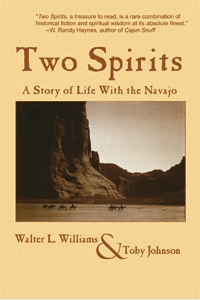
TWO SPIRITS: A Story of Life with
the
Navajo, a collaboration with Walter L. Williams

CHARMED
LIVES: Spinning Straw into
Gold: GaySpirit in Storytelling, a collaboration with
Steve Berman and some 30 other writers

THE MYTH OF THE GREAT
SECRET:
An
Appreciation of Joseph Campbell

IN SEARCH OF GOD IN THE
SEXUAL UNDERWORLD: A Mystical Journey
Unpublished manuscripts
About ordering
Books on
Gay Spirituality:
White
Crane Gay Spirituality Series


Articles
and Excerpts:
Review of Samuel
Avery's The
Dimensional Structure of Consciousness
Funny
Coincidence: "Aliens Settle in San Francisco"
About Liberty Books, the
Lesbian/Gay Bookstore for Austin, 1986-1996
The Simple Answer to the Gay Marriage Debate
A
Bifurcation of Gay Spirituality
Why gay people should NOT Marry
The Scriptural Basis for
Same Sex Marriage
Toby and Kip Get Married
Wedding Cake Liberation
Gay Marriage in Texas
What's ironic
Shame on the American People
The "highest form of love"

Gay Consciousness
Why homosexuality is a sin
The cause of homosexuality
The
origins of homophobia
Q&A
about Jungian ideas in gay consciousness
What
is homosexuality?
What
is Gay Spirituality?
My three
messages
What
Jesus said about Gay
Rights
Queering
religion
Common
Experiences Unique to Gay
Men
Is there a "uniquely gay
perspective"?
The
purpose of homosexuality
Interview on the Nature of
Homosexuality
What the Bible Says about
Homosexuality
Mesosexual
Ideal for Straight Men
Varieties
of Gay Spirituality
Waves
of Gay Liberation Activity
The Gay Succession
Wouldn’t You Like to Be Uranian?
The Reincarnation of
Edward Carpenter
Why Gay Spirituality: Spirituality
as Artistic Medium
Easton Mountain Retreat Center
Andrew Harvey &
Spiritual Activism
The Mysticism of
Andrew Harvey
The
upsidedown book on MSNBC

Enlightenment
"It's
Always About You"
The myth of the Bodhisattva
Avalokitesvara
Joseph
Campbell's description of
Avalokiteshvara
You're
Not A Wave
Joseph Campbell Talks
about Aging
What is Enlightenment?
What is reincarnation?
How many lifetimes in an
ego?
Emptiness & Religious Ideas
Experiencing experiencing experiencing
Going into the Light
Meditations for a Funeral
Meditation Practice
The way to get to heaven
Buddha's father was right
What Anatman means
Advice to Travelers to India
& Nepal
The Danda Nata
& goddess Kalika
Nate Berkus is a bodhisattva
John Boswell was Immanuel Kant
Cutting
edge realization
The Myth of the
Wanderer
Change: Source of
Suffering & of Bliss
World Navel
What the Vows Really
Mean
Manifesting
from the Subtle Realms
The Three-layer
Cake
& the Multiverse
The
est Training and Personal Intention
Effective
Dreaming in Ursula LeGuin's The Lathe of Heaven

Gay
Spirituality
Curious
Bodies
What
Toby Johnson Believes
The
Joseph Campbell Connection
The
Mann Ranch (& Rich Gabrielson)
Campbell
& The Pre/Trans Fallacy
The
Two Loves
The
Nature of Religion
What's true about
Religion
Being
Gay is a Blessing
Drawing Long Straws
Freedom
of Religion

The
Gay Agenda
Gay
Saintliness
Gay
Spiritual Functions
The subtle workings of the spirit
in gay men's lives.
The Sinfulness of
Homosexuality
Proposal
for a study of gay nondualism
Priestly Sexuality
Having a Church to
Leave
Harold Cole on Beauty

Marian Doctrines:
Immaculate Conception & Assumption
Not lashed to the
prayer-post
Monastic or Chaste
Homosexuality
Is It Time to Grow
Up? Confronting
the Aging Process
Notes on Licking
(July, 1984)
Redeem Orlando
Gay Consciousness changing
the
world by Shokti LoveStar
Alexander Renault
interviews Toby
Johnson

Mystical Vision
"The
Evolution of Gay Identity"
"St. John of the
Cross & the Dark Night of
the Soul."
Avalokiteshvara
at the Baths
Eckhart's Eye
Let Me
Tell You a Secret
Religious
Articulations of the
Secret
The
Collective Unconscious
Driving as
Spiritual Practice
Meditation
Historicity
as Myth
Pilgrimage
No
Stealing
Next
Step in Evolution
The
New Myth
The Moulting of the Holy Ghost
Gaia
is a Bodhisattva

The Hero's
Journey
The
Hero's Journey as archetype -- GSV 2016
The Gay Hero Journey
(shortened)
You're
On Your Own
Superheroes

Seeing
Differently
Teenage
Prostitution and the Nature of Evil
Allah
Hu: "God is present here"
Adam
and Steve
The Life is
in the Blood
Gay retirement and the "freelance
monastery"
Seeing with
Different Eyes
Facing
the Edge: AIDS as an occasion for spiritual wisdom
What
are you looking for in a gay science fiction novel?

The Vision
The
mystical experience at the Servites' Castle in Riverside
A Most Remarkable
Synchronicity in
Riverside
The
Great Dance according to C.S.Lewis

The Techniques Of The
World Saviors
Part 1: Brer Rabbit and the
Tar-Baby
Part 2: The
Bodhisattva Avalokiteshvara
Part 3: Jesus
and the Resurrection
Part 4: A
Course in Miracles

The
Secret of the Clear Light
Understanding
the Clear Light
Mobius
Strip
Finding
Your
Tiger Face
How Gay Souls Get Reincarnated

Joseph
Campbell, the Hero's Journey, and the modern Gay Hero-- a five part
presentation on YouTube

About Alien Abduction
In
honor of Sir Arthur C Clarke
Karellen was a homosexual
The
D.A.F.O.D.I.L. Alliance
Intersections
with the movie When We Rise
More
about Gay Mental Health
Psych
Tech Training
Toby
at the California Institute
The
Rainbow Flag
Ideas for gay
mythic stories

People
Kip and Toby,
Activists
Toby's
friend and nicknamesake Toby Marotta.
Harry
Hay, Founder of the gay movement
About Hay and The New Myth
About
Karl
Heinrich Ulrichs, the first
man to really "come out"
About Michael Talbot, gay mystic
About Fr. Bernard Lynch
About Richard Baltzell
About Guy Mannheimer
About David Weyrauch
About
Dennis Paddie
About Ask the Fire
About
Arthur Evans
About
Christopher Larkin
About Mark Thompson
About Sterling Houston
About Michael Stevens
The Alamo Business
Council
Our friend Tom Nash
Second March on
Washington
The
Gay
Spirituality Summit in May 2004 and the "Statement
of Spirituality"

Book
Reviews
Be Done on Earth by Howard
E. Cook
Pay Me What I'm Worth by
Souldancer
The Way Out by Christopher
L Nutter
The Gay Disciple by John Henson
Art That Dares by Kittredge Cherry
Coming Out, Coming Home by Kennth
A. Burr
Extinguishing
the Light by B. Alan Bourgeois
Over Coffee: A conversation
For Gay
Partnership & Conservative Faith by D.a. Thompson
Dark Knowledge
by
Kenneth Low
Janet Planet by
Eleanor
Lerman
The
Kairos by Paul E. Hartman
Wrestling
with Jesus by D.K.Maylor
Kali Rising by Rudolph
Ballentine
The
Missing Myth by Gilles Herrada
The
Secret of the Second Coming by Howard E. Cook
The Scar Letters: A
Novel
by Richard Alther
The
Future is Queer by Labonte & Schimel
Missing Mary
by Charlene Spretnak
Gay
Spirituality 101 by Joe Perez
Cut Hand: A
Nineteeth Century Love Story on the American Frontier by Mark Wildyr
Radiomen
by Eleanor Lerman
Nights
at
Rizzoli by Felice Picano
The Key
to Unlocking the Closet Door by Chelsea Griffo
The Door
of the Heart by Diana Finfrock Farrar
Occam’s
Razor by David Duncan
Grace
and
Demion by Mel White
Gay Men and The New Way Forward by Raymond L.
Rigoglioso
The
Dimensional Stucture of Consciousness by Samuel Avery
The
Manly Pursuit of Desire and Love by Perry Brass
Love
Together: Longtime Male Couples on Healthy Intimacy and Communication
by Tim Clausen
War
Between Materialism and Spiritual by Jean-Michel Bitar
The
Serpent's Gift: Gnostic Reflections on the Study of Religion by
Jeffrey J. Kripal
Esalen:
America and the Religion of No Religion by Jeffrey J. Kripal
The
Invitation to Love by
Darren Pierre
Brain,
Consciousness, and God: A Lonerganian Integration by Daniel A
Helminiak
A
Walk with Four Spiritual Guides by Andrew Harvey
Can Christians Be Saved? by Stephenson & Rhodes
The
Lost Secrets of the Ancient Mystery Schools by Stephenson &
Rhodes
Keys to
Spiritual
Being: Energy Meditation and Synchronization Exercises by Adrian
Ravarour
In
Walt We
Trust by John Marsh
Solomon's
Tantric Song by Rollan McCleary
A Special Illumination by Rollan McCleary
Aelred's
Sin
by Lawrence Scott
Fruit
Basket
by Payam Ghassemlou
Internal
Landscapes by John Ollom
Princes
& Pumpkins by David Hatfield Sparks
Yes by Brad
Boney
Blood of the Goddess by William Schindler
Roads of Excess,
Palaces of
Wisdom by Jeffrey Kripal
Evolving
Dharma by Jay Michaelson
Jesus
in Salome's Lot by Brett W. Gillette
The Man Who Loved Birds by Fenton Johnson
The
Vatican Murders by Lucien Gregoire
"Sex Camp"
by
Brian McNaught
Out
& About with Brewer & Berg
Episode One: Searching for a New Mythology
The
Soul Beneath the Skin by David Nimmons
Out
on
Holy Ground by Donald Boisvert
The
Revotutionary Psychology of Gay-Centeredness by Mitch Walker
Out There
by Perry Brass
The Crucifixion of Hyacinth by Geoff Puterbaugh
The
Silence of Sodom by Mark D Jordan
It's
Never About What It's About by Krandall Kraus and Paul Borja
ReCreations,
edited by Catherine Lake
Gospel: A
Novel
by WIlton Barnhard
Keeping
Faith: A Skeptic’s Journey by Fenton Johnson
Dating the Greek Gods by Brad Gooch
Telling
Truths in Church by Mark D. Jordan
The
Substance of God by Perry Brass
The
Tomcat Chronicles by Jack Nichols
10
Smart
Things Gay Men Can Do to Improve Their Lives by Joe Kort
Jesus and the Shamanic Tradition of Same Sex Love
by Will Roscoe
The
Third Appearance by Walter Starcke
The Last Hours of Ancient Sunlight by Thom Hartmann
Surviving
and Thriving After a Life-Threatening Diagnosis by Bev Hall
Men,
Homosexuality, and the Gods by Ronald Long
An Interview
with Ron Long
Queering Creole Spiritual Traditons by Randy
Conner & David Sparks
An Interview with
Randy Conner
Pain,
Sex
and Time by Gerald Heard
Sex
and the Sacred by Daniel Helminiak
Blessing Same-Sex Unions by Mark Jordan
Rising Up
by
Joe Perez
Soulfully
Gay
by Joe Perez
That
Undeniable Longing by Mark Tedesco
Vintage: A
Ghost
Story by
Steve Berman
Wisdom
for the Soul by Larry Chang
MM4M a DVD
by Bruce Grether
Double
Cross
by David Ranan
The
Transcended Christian by Daniel Helminiak
Jesus
in Love by Kittredge Cherry
In
the Eye of the Storm by Gene Robinson
The
Starry Dynamo by Sven Davisson
Life
in
Paradox by Fr Paul Murray
Spirituality for Our Global Community by Daniel
Helminiak
Gay & Healthy in a Sick Society by Robert A.
Minor
Coming Out: Irish Gay Experiences by Glen O'Brien
Queering
Christ
by Robert Goss
Skipping
Towards Gomorrah by Dan Savage
The
Flesh of the Word by Richard A Rosato
Catland by
David Garrett Izzo
Tantra
for Gay Men by Bruce Anderson
Yoga
&
the Path of the Urban Mystic by Darren Main
Simple
Grace
by Malcolm Boyd
Seventy
Times Seven by Salvatore Sapienza
What
Does "Queer" Mean Anyway? by Chris Bartlett
Critique of Patriarchal Reasoning by Arthur Evans
Gift
of
the Soul by Dale Colclasure & David Jensen
Legend of the Raibow Warriors by Steven McFadden
The
Liar's
Prayer by Gregory Flood
Lovely
are the Messengers by Daniel Plasman
The Human Core of Spirituality by Daniel Helminiak
3001:
The Final Odyssey by Arthur C. Clarke
Religion and the Human Sciences by Daniel Helminiak
Only
the
Good Parts by Daniel Curzon
Four
Short
Reviews of Books with a Message
Life
Interrupted by Michael Parise
Confessions of a Murdered Pope by Lucien Gregoire
The
Stargazer's Embassy by Eleanor Lerman
Conscious
Living, Conscious Aging by Ron Pevny
Footprints Through the Desert by Joshua Kauffman
True
Religion by J.L. Weinberg
The Mediterranean Universe by John Newmeyer
Everything
is God by Jay Michaelson
Reflection
by Dennis Merritt
Everywhere
Home by Fenton Johnson
Hard Lesson by James
Gaston
God
vs Gay?
by Jay Michaelson
The
Gate
of Tears: Sadness and the Spiritual Path by Jay Michaelson
Roxie
&
Fred by Richard Alther
Not
the Son He Expected by Tim Clausen
The
9 Realities of Stardust by Bruce P. Grether
The
Afterlife Revolution by Anne & Whitley Strieber
AIDS
Shaman:
Queer Spirit Awakening by Shokti Lovestar
Facing the Truth of Your Life by Merle Yost
The
Super Natural by Whitley Strieber & Jeffrey J Kripal
Secret
Body by
Jeffrey J Kripal
In
Hitler's
House by Jonathan Lane
Walking on Glory by Edward Swift
The
Paradox
of Porn by Don Shewey
Is Heaven for Real? by Lucien Gregoire
Enigma by Lloyd Meeker
Scissors,
Paper, Rock by Fenton Johnson
Toby
Johnson's
Books on Gay Men's Spiritualities:

Gay Perspective
Things Our [Homo]sexuality
Tells Us
about the
Nature of God and
the Universe
Gay
Perspective is available as an audiobook narrated
by Matthew Whitfield. Click
here

Gay Spirituality
Gay Identity and
the Transformation of
Human Consciousness
Gay
Spirituality is now
available as an audiobook, beautifully narrated by John Sipple. Click here

Charmed
Lives: Gay Spirit in Storytelling
edited by
Toby Johnson
& Steve Berman

Secret
Matter
Lammy Award Winner for Gay
Science Fiction
updated

Getting Life in
Perspective
A Fantastical Romance
Getting
Life in Perspective is available as an
audiobook narrated by Alex Beckham. Click
here

The Fourth Quill
originally published
as
PLAGUE
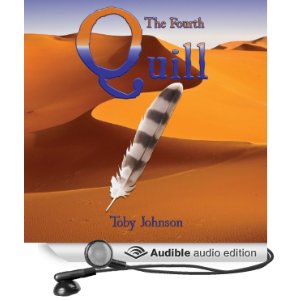
The Fourth Quill is
available
as an audiobook, narrated by Jimmie
Moreland. Click here

Two Spirits: A Story of
Life
with the Navajo
with Walter L. Williams
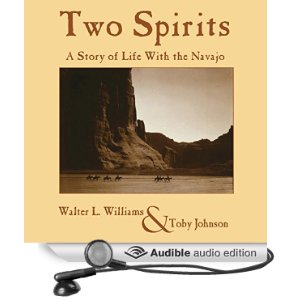 Two
Spirits is available as an
audiobook narrated by Arthur Raymond. Click
here Two
Spirits is available as an
audiobook narrated by Arthur Raymond. Click
here

Finding
Your Own True Myth: What I Learned from Joseph
Campbell
The
Myth
of the
Great Secret III

In Search of God in the Sexual Underworld

The Myth of the Great
Secret: An Appreciation of Joseph Campbell.
This
was the second edition of this book.

Toby Johnson's
titles are
available in other ebook formats from Smashwords.
|
The Two Loves are:
 love by
complement love by
complement
 love by reflection love by reflection
~
~ ~
The Two Loves is a theme that runs through gay spiritual
thinking.
Below are several different but parallel and relatively consistent
expositions of this idea.
~
~
~ ~
Joseph
"Joe" Perez
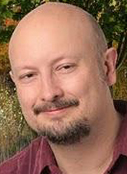 Gay
spirituality writer Joseph "Joe" Perez writes extensively and
eloquently about
these two facets of reality in what he titles a Theory of Homophilia. Gay
spirituality writer Joseph "Joe" Perez writes extensively and
eloquently about
these two facets of reality in what he titles a Theory of Homophilia.
In the Integral
Life website, Perez is described as "an ambassador of the Integral
vision
[espoused by Ken Wilber] to the gay, lesbian, bisexual, and transgender
community. Perez advances the idea that sexual and gender diversity is
best understood as a tetra-arising object of evolution. He suggests
that "gayness" or "homophilia" is a deep structure inherent in human
nature (corresponding to self-immanence or Agape in Ken Wilber's theory
of holonic tenets), and this structure takes on a variety of diverse
forms. Accordingly, Perez views the contemporary worldwide gay rights
movement as an important event in the emergence of greater and deeper
human consciousness."
Joe
Perez argues that there are
four major patterns, archetypal and universal: masculine, feminine,
other-directed, and same-directed. Love is a manifestation of the
soul’s desire to be reunited with God both as love for others
(heterophilia) and love for the self or similar (homophilia).
N.B. Joe Perez technically posits a "distinction between
what is human and what is divine" that I run rough shod over in my
poetical-orcular declarations below in the summary of God as One with
the Universe—tj
In Gay S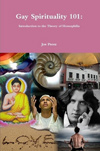 pirituality 101, Perez writes: pirituality 101, Perez writes:
The inescapable conclusion is that Love must flow in two directions:
from God to Creation and then returning from Creation to God (or from
Spirit to the soul, and back again from soul to Spirit). These
directions are often described philosophically as Agape and Eros
respectively. There are many ways to describe these two direcftions,
but one is mor primordial than the others: "There are two archetypal
ways of loving—yin and yang… inner-directed or same-directed ways…[and] outer-directed or
other-directed ways.
Another way of talking about outer-directed love is other-directed love and
inner-directed love is same-directed
love. And because the Greek prefix homo-
means same and hetero-
means other, we see that Heterophilia is the yang direction of Love and
Homophilia is its yin direction. Homophilia, also known as "gayness,"
is ontologically at the Root of All Things as an expression of Agape,
describing how God loves creation; it is also expressed as the force of
involution which complements evolution.
Read
Toby Johnson's brief, 5-star review of Perez's Gay Spirituality 101
~ ~ ~ ~
Toby Johnson
Toby Johnson
(writer of
this webpage) suggested a similar notion in the book The Myth of the Great Secret
(Morrow, 1982).
| The universe can be seen as dual; it
can be seen as unitary. God is the lover seeking his complementary
opposite in the world, and the lover beholding the goodness in his/her
own reflection. God is the solitary pleasuring self, the adventurer
playing joyfully in the world, and the mother giving birth. All of the
styles of sexuality can be divinized. |
It's an indication of consistency of gay spiritual
thinking that Perez
and Johnson express similar ideas. And it's an evolution in gay
spirituality that Perez introduces this idea to followers of Ken Wilber
and expresses it in Wilber's Integral terminology, much as Johnson
presented this idea to fans of Joseph Campbell and expressed it in
Campbellian mythic themes. (Read Toby Johnson's article on the Integral Theory
"Pre/Trans Fallacy")
Here's an excerpt from The Myth of the Great Secret: A Search for
Spiritual Meaning in the Face of Emptiness
(Johnson's first
edition of this book.)
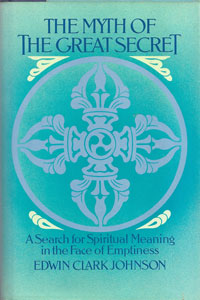 Sexual
arousal, whether experienced with the participation of another person
or enjoyed alone in the presence only of oneself and one’s fantasies,
alters consciousness. The state of arousal itself manifests God’s
pleasuring himself in the creative act whereby the universe came to
be—full of beauty and full of embodiment for each of us. The desires of
the flesh, the myths warn, can lead us away from God, but they can also
be divinized by understanding them as promptings of life seeking its
own vibrant enjoyment. And as Saint Paul—of all people—recognized,
attraction metaphorizes the relation between God and the world, between
spirit and matter. Sexual
arousal, whether experienced with the participation of another person
or enjoyed alone in the presence only of oneself and one’s fantasies,
alters consciousness. The state of arousal itself manifests God’s
pleasuring himself in the creative act whereby the universe came to
be—full of beauty and full of embodiment for each of us. The desires of
the flesh, the myths warn, can lead us away from God, but they can also
be divinized by understanding them as promptings of life seeking its
own vibrant enjoyment. And as Saint Paul—of all people—recognized,
attraction metaphorizes the relation between God and the world, between
spirit and matter.
Attraction, sexual and
nonsexual, between a woman and a man witnesses to the interplay of
opposites which generates the world. Chinese philosophy calls these
primal forces the yin and the yang, dark and light, receptive and
creative, passive and active, feminine and masculine. Female and male
are special cases of these polarities. The attraction between male and
female manifests the duality that stirs creation.
In the same way, attraction,
nonsexual and sexual, between two men or between two women witnesses to
the ultimate unity of the world beyond duality. Monistic philosophies
have seen that beneath the apparent swirl of polarities, ever growing,
ever changing, clashing in conflict and cooperating in love, lies a
deeper stratum in which all is at rest in a self-mirroring perception
that all is one and that the opposites are illusory. The attraction
between same-sex individuals manifests the identity that precedes the
duality.
Especially
in dealing with
the tradition-violating styles of sexual behavior that modern society
seems to be moving toward and that the churches have long condemned, we
must seek to understand the signs that guide our wandering. The
condemnations may provide signs for some, but not for others. The signs
can never be taken only at face value. Choosing one’s own sexual
style—deciding not to get married or to pursue a variety of partners or
to come out as gay—breaks with tradition. In such a life the position
of the tradition may assist growth, because it forces deep personal
retrenchment and self-evaluation in which the individual grows ever
more conscious. The dilemma posed by the old morality that must be
overthrown can drive the mind beyond the superficial rules into a state
in which one sees that one must take responsibility for one’s own
experience and so let go of morality as an outside force and integrate
it into one’s own personal code of behavior. Violating taboos, the
Tantrics of both Buddhism and Hinduism have discovered, can be
spiritually compelling and enriching.
Of course, it is
not
necessary that taboos be violated, but it probably is necessary that
the sometimes confusing and disturbing, yet always alluring and
compelling, sexual feelings be placed in a context which divinizes
them. The universe can be seen as dual; it can be seen as unitary. God
is the lover seeking his complementary opposite in the world, and the
lover beholding the goodness in his/her own reflection. God is the
solitary pleasuring self, the adventurer playing joyfully in the world,
and the mother giving birth. All of the styles of sexuality can be
divinized.
The Second edition (1992) added this material—which then
includes a kind of theory of sex:
Modern
psychology, especially
body-work-oriented psychotherapy, has discovered that sexuality has
other functions in human beings besides reproduction.
Paradoxically,
engaging in sex outside the reproductive context has been called
indulging our animal nature. It is precisely the opposite. Animal
nature is to copulate instinctively only to produce progeny. As Jacob
Bronowski observed, what is natural for human beings is certainly not
behavior that is found also in animals, but what is different and
unique to humans. Human beings, of course, feel the instinct to produce
progeny, but that is only part of our sexual experience. (Our
over-populated world proves we needn’t fear that condoning
non-procreative sex will threaten racial survival.) Precisely the way
we differ from animals that have rigid sexual cycles and less involving
and less orgasmic intercourse is that human sexual contact involves
consciousness and volition.
According to Reichian and
neo-Reichian body-work therapists, the whole body is involved in
psychological processes; consciousness and intelligence are not merely
in the brain. They have discovered that traumas, fears, negative
conditioning, and the like result in tightness and restrictions in the
body that distort both psychological and purely physical processes.
These can result not only in neurosis and mental illness, but also in
psychosomatic disorders, cardiovascular disease and perhaps even cancer.
Reichian therapy
consists of
practicing better and more complete releases of tension through crying,
screaming, vomiting, and coming to orgasm. Learning to allow spasmodic
release and emotional catharsis helps prevent deformation of the
nervous system. The surge of energy during orgasm can break open the
blocks and keep the system clear of restrictions to the vital flow. The
role of orgasm in the human being then is more than just ejaculation or
reception of genetic material. The aim of “total orgasm” is not simply
to get a narcissistic satisfaction, as suggested by many critics of the
California-based fascination during the seventies with bigger and
better orgasms, but to activate an important self-regulating mechanism
in the mind-body system.
Orgasm
is protrayed
mythologically—kundalini in Tantrism, for instance—as a conscious
experience of cosmic energy. Orgasm is certainly an experience of
neurological dynamics. It has no content. Like a dream it is forgotten
almost as soon as it is over.
Perhaps the function of sex
and orgasm in human beings has been not only to clear the individual
nervous system but—and consequently—to affect the way the nervous
system itself has evolved. Human beings are sexually motivated
differently from almost every other species on our planet. Because
women’s sexual interest is not restricted by an estrus cycle, human
beings are sexually and psychologically available and motivated all the
time. We engage in sexual foreplay beyond instinctual seduction
rituals. We experience orgasm more completely, it appears, than other
animals.
Indeed, our females have
orgasms, something not particularly needed for the continuation of the
species (as, sadly, generations of women suffering religion-induced
frigidity can attest). And, at least among land animals, we alone have
developed sophisticated language and complex brain functions. Perhaps
our sexuality is in some ways responsible for, or at least intrinsic
to, our evolution of intelligence and conscious thought.
In discussing the role of the
spiritual aspects of consciousness, I’ve been suggesting that perhaps
the ability to experience wonder, to feel curiosity, to develop myth,
and to ask questions forced open the neural pathways that directed the
path of survival up toward consciousness and humanity. Similarly,
sexuality can be understood as the experience in the flesh of what in
the mind is wonder and curiosity. Sexual attraction is the desire to
know another’s body, to feel the flesh, to experience the rhythms of
the other’s movement. It is the drive to enter into relationship with
the other, to try to see from the other’s perspective, and so to add
complexity to one’s own experience of life. And within the act of
lovemaking itself, sex is the experience of joy in being embodied and
of the body being caught up by a deeply primal, transpersonal force.
It
is not surprising that one consequence of such an experience of wonder
should be genetic transfer and reproduction of life through time and
through evolutionary advance. Sex as experience of the life force
perhaps precedes sex as a tool for reproduction. Our sexuality, far
from being a distraction from God, can be understood as the instrument
by which God created us and continues to manifest Godself to us.
Particularly
in the sense
that all of us are manifestations of the One Self, our experience of
loving another person is our participation in the divine love for
creation. And our experience of being loved is our perception of God’s
love for us. Indeed God has no way to demonstrate love for creatures
except through the creatures’ love for one another. This love for
creation is not some curious will that creatures overcome their
corporality. The flesh is the mode of creation. God’s love for us and
our love for God is experienced in our flesh.
We are blinded to the
holiness of the flesh by fear and desire, by the tendency of the senses
to get stuck, to delude us into believing we are just egos, by our
failure to see the whole, to see life in context, by our failure “to
see the forest for the trees.” Of course the importance of sex can be
exaggerated and desire can get out of hand. But we will not develop
vision by fleeing the flesh, by condemning our sexuality, by making
other people wrong for enjoying sex, by refusing to love God’s
manifestation in the flesh. A positive attitude toward sex can help
bring us into touch with the resurrected body we carry, so
unconsciously, along with us all our lives.
Isn’t this positive attitude,
this affirmation of incarnated human life, what is meant by the
saviors’ embrace of the human condition—even of sin and suffering? “God
so loved the world…”
Amazon.com links:
~ ~ ~ ~
Harry Hay & Will Roscoe
Harry
Hay, titular Founder of the modern Gay Rights Movement and creator in
spirit of the Radical Faeries and inevitable influence on all gay
thinking, described these two loves (a litlte more cynically than I or
Joe Perez) as subject-object and subject-SUBJECT.

Wikipedia provides a succinct description (based on writing in Radically Gay: Gay Liberation in the Words
of its Founder, edited by Will Roscoe (1996):
Subject-SUBJECT consciousness, a
concept proposed by Harry Hay believed by Hay to be gay people's unique
perspective on the world.
Hay saw heterosexual society existing in a subject-object dynamic;
where men, who had the culturally acceptable power, saw only themselves
as subject and therefore higher than women, who were treated as objects
and property. Hay extrapolated this interpersonal-sexual dynamic
(male-power:female-subordinate) into a broader social context,
believing that the subject-object relationship was the driving force
behind most all of societies ills. Objectification served as a barrier,
emotionally separating an individual (subject) from another individual
by dehumanizing them, making them object.
When Hay looked at same-sex relationships, however, he saw a different
dynamic at work. He believed that homosexual relationships were based
on mutual respect and empathy for the other: a longing for a companion
who was as equally valuable as the self. Hay termed this
interpersonal-sexual dynamic subject-SUBJECT (which Hay capitalized for
emphasis in all of his writings). He believed that this subject-SUBJECT
way of viewing the world was gay people's most valuable contribution to
the greater society. By empathizing with all people, relating to each
other as equal-to-equal, society would change drastically and social
injustices would be eradicated.
Visit Will Roscoe's website willsworld.org
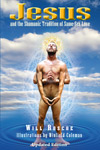
Roscoe understands the radical
newness of the teaching of love of others as love of God given by Jesus
Christ as love of equals. In his book Jesus and the
Shamanic Tradition of Same-Sex Love, Roscoe presents the
real meaning of Jesus's commandment of love.
For more about Harry Hay (and Will Roscoe),
see
from White Crane Books
The Trouble With Harry Hay
Founder of the Modern Gay Movement
By Stuart Timmons
Foreword by Will Roscoe, PhD
~ ~ ~ ~
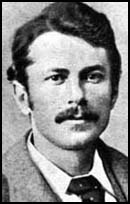
Edward Carpenter
Edward Carpenter (29
August 1844 – 28 June 1929), proto-gay writer, philosopher, scholar and
model of
life even today, wrote of love that can be understood to include these
"two loves." He defined love as the aim of non-differentiation:
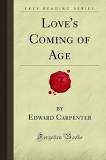
In Love's Coming of Age, a book
written about sexuality in general (i.e., primarily heterosexuality),
he notes
that in the long run people tend to settle down into one deep permanent
union,
but along the way they ought to be experiencing a variety of
interpersonal
relationships and sexual adventures. And he warns that the ideal of
exclusive
attachment can lapse into a mere stagnant double selfishness. That is,
like
today's sexual liberationists, he calls for love and devotion
between
individuals without the quality of their love being defined by
exclusiveness
based in jealousy, a petty sense of private property in the other
person,
social opinions, and legal enactments. These, he says, suffocate wedded
love in
egoism, lust, and, meanness. Most importantly, Carpenter writes
positively of
sex--"with a sense almost of religious
consecration"--speaking of it as a good
thing in human consciousness, not a sign or cause of human frailty and
sinfulness.
Sex is the allegory of Love in
the
physical world.
It is from this fact that it derives its immense power. The aim of Love
is
non-differentiation --absolute union of being; but absolute union
can only be
found at the centre of existence. Therefore whoever has truly found
another has
found not only that other, and with that other himself, but has found
also a
third--who dwells at the centre and holds the plastic material of
the universe
in the palm of his hand, and is a creator of sensible forms.
Notice that in
the
paragraph, just
cited, though intended to be understood as about male-female bonding in
marriage, the pronouns are impersonal enough to include homosexual
bonding. And
the aim he proposes for Love, "non-differentiation," is
clearly something much
more homosexual than heterosexual. Men in love with women hardly think
of
themselves as 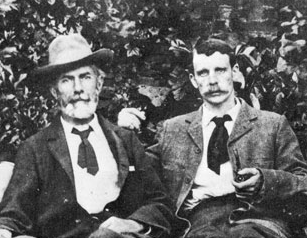 becoming non-differentiated from
femaleness. Males in
love with
females do not think of themselves as becoming womanly, certainly not
the same
way that homosexual lovers think of themselves becoming one another. So
it is
kind of homosexual connection, generalized to the point of seeming to
include
male-female connections, that Carpenter offers as the immense power of
Love
(capitalized, perhaps, to accord it that "religious
consecration"). becoming non-differentiated from
femaleness. Males in
love with
females do not think of themselves as becoming womanly, certainly not
the same
way that homosexual lovers think of themselves becoming one another. So
it is
kind of homosexual connection, generalized to the point of seeming to
include
male-female connections, that Carpenter offers as the immense power of
Love
(capitalized, perhaps, to accord it that "religious
consecration").
(Photo
of Edward Carpenter and life partner George Merrill, early 20th
Century).
Unlike
most of
his
contemporaries,
including the relatively gay-positive ones like Richard von
Krafft-Ebing whose
book was titled Psychopathia sexualis, Carpenter included homosexuality as
part of
a
discussion of general sexuality and
not as a pathology. Indeed, Carpenter predicted that homosexuality
would be
accepted as normal in human life. Though, of course, there's
still much
contention about this, his prediction has effectively become true.
It
is in his
ideas
about
homosexuality, as exemplified in The Intermediate Sex (the introductory section of which
appeared in the
1906 edition of Love's Coming of Age),
that Edward Carpenter offers ideas that resonate with modern
consciousness.
--
He praised
the
blending of gender
traits in what he calls "intermediate types" or "urnings," as was the
popular
self-chosen term of his day. (Urning is derived from "Uranian" which in
turn
comes from the recently discovered planet Uranus (1781) which was held
to
control homosexuals the same way Mars and Venus were held to control
and/or
symbolize males and females. "Uranus," by the way,
"heaven," so Uranians are "inhabitants of heaven.")
--
Carpenter
placed
the coming of
age and consciousness of such Uranians as a part of the general
transformation
of consciousness that is modernity (symbolized by the astronomical
discoveries
of the modern era that, of course, included the planet Uranus).
--
Carpenter
wrote
that
homosexuality bestows beneficial traits, among these are religious and
spiritual sensitivities and good interpersonal interactions. He notes
that
homosexuals are good counselors and go-betweens for
men and women.
Read
more about Edward Carpenter
~ ~ ~ ~
Michael Sigmann
There's
a parallel idea--at least in how sexual energies and gender differences
balance out one another--in Michael Sigmann's theories of homosexuality
in evolution. Sigmann explains his concepts in workshops and seminars
through The
Gateway, based in San Francisco.

Michael Sigmann, gay spiritual teacher and workshop
facilitator at The Gateway/Men's Inner Journey, offers a theory he
calls The Neutral Force. Using the imagery of electrical and magnetic
charge, he argues that homosexuality represents a Third Sex.
On the Internet, Sigmann writes: "Spiritual teachings today address
life in terms of masculine feminine, yin yang, male female etc. Yet
physics tells us that life is not based on a two-gender system. It's
based on a three-gender system [positive, negative and neutral].
[Sigmann] presents the three genders of human sexuality, and the vital
role homosexuality plays in the evolution of the human species…
"…the emergence of homosexuality in the world today represents the
emergence of the neutral force in society. The emergence of the neutral
force represents the emergence of the third gender of energy, proven by
physics to aid in the procreation of the human species by grounding the
sexual energy within our society."
Here's
a
link to a YouTube video
in which H.R. Bremner, Facilitation Coordinator for The Gateway, shares
his understanding of Michael Sigmann's teaching of "The
Neutral Force".
Sigmann's book (in process) is titled Why Gay Sex Matters: A gay man's guide
to self-discovery. Here's
a video of him explaining his idea.
 Sigmann
explains: "The three symbols… represent the three magnetic charges,
presented here as the three positions of human sexuality - feminine
position- receptive - or bottom, aka the 'in', the neutral position,
versatile, aka the 'ground', and the masculine position - responsive -
top aka the 'out'. Barring any physical or psychological limitations,
gay men are sexually versatile beings. Our existence is the embodiment
of the neutral force within the collective. The image below is part of
the branding for the book - Why Gay Sex Matters: A gay man's guide
to self-discovery." Sigmann
explains: "The three symbols… represent the three magnetic charges,
presented here as the three positions of human sexuality - feminine
position- receptive - or bottom, aka the 'in', the neutral position,
versatile, aka the 'ground', and the masculine position - responsive -
top aka the 'out'. Barring any physical or psychological limitations,
gay men are sexually versatile beings. Our existence is the embodiment
of the neutral force within the collective. The image below is part of
the branding for the book - Why Gay Sex Matters: A gay man's guide
to self-discovery."
~ ~ ~ ~

Sigmann's The Gateway
uses an image of a lotus reflecting itself.
~ ~ ~
There's an echo of Toby Johnson's notion that "God" relates to himself
as reflection in gay consciousness.
The Two Loves are:
love by
complement
love by reflection
The
universe manifests two basic truths.
These are
experienced by us
human beings in two different experiences of love.
Heterosexual love manifests the dynamic
interaction of opposite poles of duality.
Homosexual love
manifests
the underlying unity.
Being straight encourages people to see the
world dualistically.
Being gay
encourages one
to see the world non-dualistically, because the duality need not matter.
~ ~ ~ ~
"God" knows Himself as the
Universe which was created by "God's" realization of His own existence
(…and manifested in
physical reality as The Big Bang).
The Universe IS consciousness growing
into greater and greater consciousness of itself.
"God" is the name human
beings use for that greater consciousness.
"God" and the Universe are distinct
from one another.
And "God" relates to His
creation as a lover to his Beloved.
"God" loves the Universe as
Himself.
"God" relates to the
universe as an observer to a mirror.
And He loves what he sees.
These two loves constitute
our love for "God" and "God's" love for us.
As we love others as
ourselves, so "God" loves us as Himself.
Heterosexual love, then,
manifests human beings' love for "God" as an Other.
And homosexual love
manifests "God's" love of us as Himself.
In the orcular conclusion of the book Process
and Reality,
renowned Process philosopher
Alfred North Whitehead
offers a series
of antitheses in which
"there is a shift of
meaning which converts the
opposition into a contrast."
The series includes and is
exemplified by
the declaration:
"It is as true to say that
God creates the World as
that the World creates God."
Similarly, by shifting
their meaning in relation to one another,
the "two loves" are
converted from an opposition into a contrast.
|



 love by
complement
love by
complement love by reflection
love by reflection Gay
spirituality writer Joseph "Joe" Perez writes extensively and
eloquently about
these two facets of reality in what he titles a Theory of Homophilia.
Gay
spirituality writer Joseph "Joe" Perez writes extensively and
eloquently about
these two facets of reality in what he titles a Theory of Homophilia. pirituality 101, Perez writes:
pirituality 101, Perez writes: ![]()
